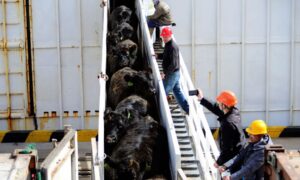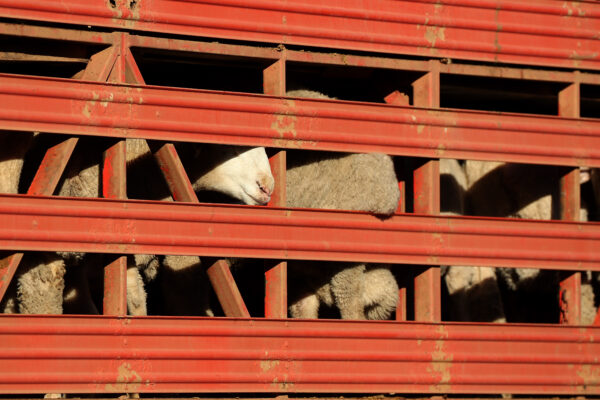‘Ewe-Turn’ Needed on Live Export Ban
Commentary The Australian federal government needs to reverse its disastrous policy to ban live sheep exports. The Labor party of today seems more beholden to inner-city green elites than the workers who serve in the sheep industry and were the spiritual founders of their party. The many shearers and farm workers who founded the union movement in the great outback of Australia would be spinning in their graves to witness the recent decision of the party they helped found turning its back on their sector with the loss of jobs for hundreds, if not thousands, of their mates. The decision to ban live sheep exports will have major ramifications (pun intended)—not only for the producers whom the Canberra political elite would ignorantly dismiss as landed gentry. The last time federal Labor played this game was with live cattle exports which bankrupted Indigenous cattle stations. It’s always the way. The most vulnerable get hurt when decisions are not thought through. Banning the more than $130 million (US$88 million) live sheep export trade will hit the farmers, but it will also hit the farm workers, truckies, shearers, hay contractors, and the list goes on, all allegedly in the name of animal welfare in circumstances where there has not been a reportable mortality rate since 2018. Agriculture Minister Murray Watt speaks during a press conference in Brisbane, Australia, on July 22, 2022. (Dan Peled/Getty Images) Having further improved its already world-leading standards, the live export sector and all agricultural producers are right to be apprehensive about what might be discharged from the government’s locker to destroy another one of their viable world-leading sectors. Western Australia the Biggest Loser Injecting an extra one million sheep into the domestic market due to the export ban will see abattoirs unable to cope with the sheer volume of stock. The lack of workforce available is compounding the problem, which in turn can develop into a separate animal welfare issue. Predictably the government will ignore or blame this on the farmers, thereby adding insult to the injury they inflicted. With the live sheep export sector decreasing quite markedly, this over-the-top government intervention was not warranted, let alone needed. Over a five-year period, the sector has diminished by 43 percent. Assurances the government would phase out the sector in an orderly fashion appear to have been completely abandoned. It must come as a full thrusted body blow for Western Australian workers involved in the sector. As the number of sheep exported live decreased, the percentage from Western Australia increased. For example, in 2014, Western Australian sheep represented 72 percent of all live sheep exports. Five years later, Western Australia represented a full 97 percent. Sheep are seen while being transported to the Al Kuwait in Fremantle, Australia, on June 16, 2020. (Paul Kane/Getty Images) Most of the live exports leave our shores via ships, where the Australian Standard for the Export of Livestock sets rigorous standards, including for density. Compliance has been noteworthy by the lower mortality rates. Not to be outdone, the government, for good measure, is banning all live sheep exports, which includes air travel. The statistics for air travel, as might be expected from an animal welfare point of view, have been exceptional, with only one death from over 22,000 transported by air. Why Now? The government’s announcement and its timing must be observed in the political climate in which it was made. An announcement decimating the live export sector is bound to grab headlines providing a blessed distraction from the superannuation debacle. The Labor government views Western Australia as an area where they can burn some political capital for some electoral benefit in inner city electorates. Nor should it be overlooked that this out-of-the-blue announcement may have been part of a deal struck with certain minority parties or individuals to garner an extra vote or two in the Senate. Without such a rationale, it is hard to justify the timing and lack of consultation. The number of Australia’s true blue workers who will be denied a livelihood as a result of this decision will be substantial, not to mention the farm businesses and other enterprises which will see their previously regulated and monitored sector damaged beyond recognition. The end result… Australia loses export dollars in the name of animal welfare, so countries without Australia’s stringent animal welfare rules can fill the void by shipping to our previously held markets from even greater distances. A textbook case study in counterproductive policy. Views expressed in this article are the opinions of the author and do not necessarily reflect the views of The Epoch Times.

Commentary
The Australian federal government needs to reverse its disastrous policy to ban live sheep exports.
The Labor party of today seems more beholden to inner-city green elites than the workers who serve in the sheep industry and were the spiritual founders of their party.
The many shearers and farm workers who founded the union movement in the great outback of Australia would be spinning in their graves to witness the recent decision of the party they helped found turning its back on their sector with the loss of jobs for hundreds, if not thousands, of their mates.
The decision to ban live sheep exports will have major ramifications (pun intended)—not only for the producers whom the Canberra political elite would ignorantly dismiss as landed gentry.
The last time federal Labor played this game was with live cattle exports which bankrupted Indigenous cattle stations. It’s always the way. The most vulnerable get hurt when decisions are not thought through.
Banning the more than $130 million (US$88 million) live sheep export trade will hit the farmers, but it will also hit the farm workers, truckies, shearers, hay contractors, and the list goes on, all allegedly in the name of animal welfare in circumstances where there has not been a reportable mortality rate since 2018.

Having further improved its already world-leading standards, the live export sector and all agricultural producers are right to be apprehensive about what might be discharged from the government’s locker to destroy another one of their viable world-leading sectors.
Western Australia the Biggest Loser
Injecting an extra one million sheep into the domestic market due to the export ban will see abattoirs unable to cope with the sheer volume of stock.
The lack of workforce available is compounding the problem, which in turn can develop into a separate animal welfare issue. Predictably the government will ignore or blame this on the farmers, thereby adding insult to the injury they inflicted.
With the live sheep export sector decreasing quite markedly, this over-the-top government intervention was not warranted, let alone needed. Over a five-year period, the sector has diminished by 43 percent.
Assurances the government would phase out the sector in an orderly fashion appear to have been completely abandoned.
It must come as a full thrusted body blow for Western Australian workers involved in the sector.
As the number of sheep exported live decreased, the percentage from Western Australia increased. For example, in 2014, Western Australian sheep represented 72 percent of all live sheep exports. Five years later, Western Australia represented a full 97 percent.

Most of the live exports leave our shores via ships, where the Australian Standard for the Export of Livestock sets rigorous standards, including for density. Compliance has been noteworthy by the lower mortality rates.
Not to be outdone, the government, for good measure, is banning all live sheep exports, which includes air travel. The statistics for air travel, as might be expected from an animal welfare point of view, have been exceptional, with only one death from over 22,000 transported by air.
Why Now?
The government’s announcement and its timing must be observed in the political climate in which it was made.
An announcement decimating the live export sector is bound to grab headlines providing a blessed distraction from the superannuation debacle.
The Labor government views Western Australia as an area where they can burn some political capital for some electoral benefit in inner city electorates.
Nor should it be overlooked that this out-of-the-blue announcement may have been part of a deal struck with certain minority parties or individuals to garner an extra vote or two in the Senate. Without such a rationale, it is hard to justify the timing and lack of consultation.
The number of Australia’s true blue workers who will be denied a livelihood as a result of this decision will be substantial, not to mention the farm businesses and other enterprises which will see their previously regulated and monitored sector damaged beyond recognition.
The end result… Australia loses export dollars in the name of animal welfare, so countries without Australia’s stringent animal welfare rules can fill the void by shipping to our previously held markets from even greater distances.
A textbook case study in counterproductive policy.
Views expressed in this article are the opinions of the author and do not necessarily reflect the views of The Epoch Times.












